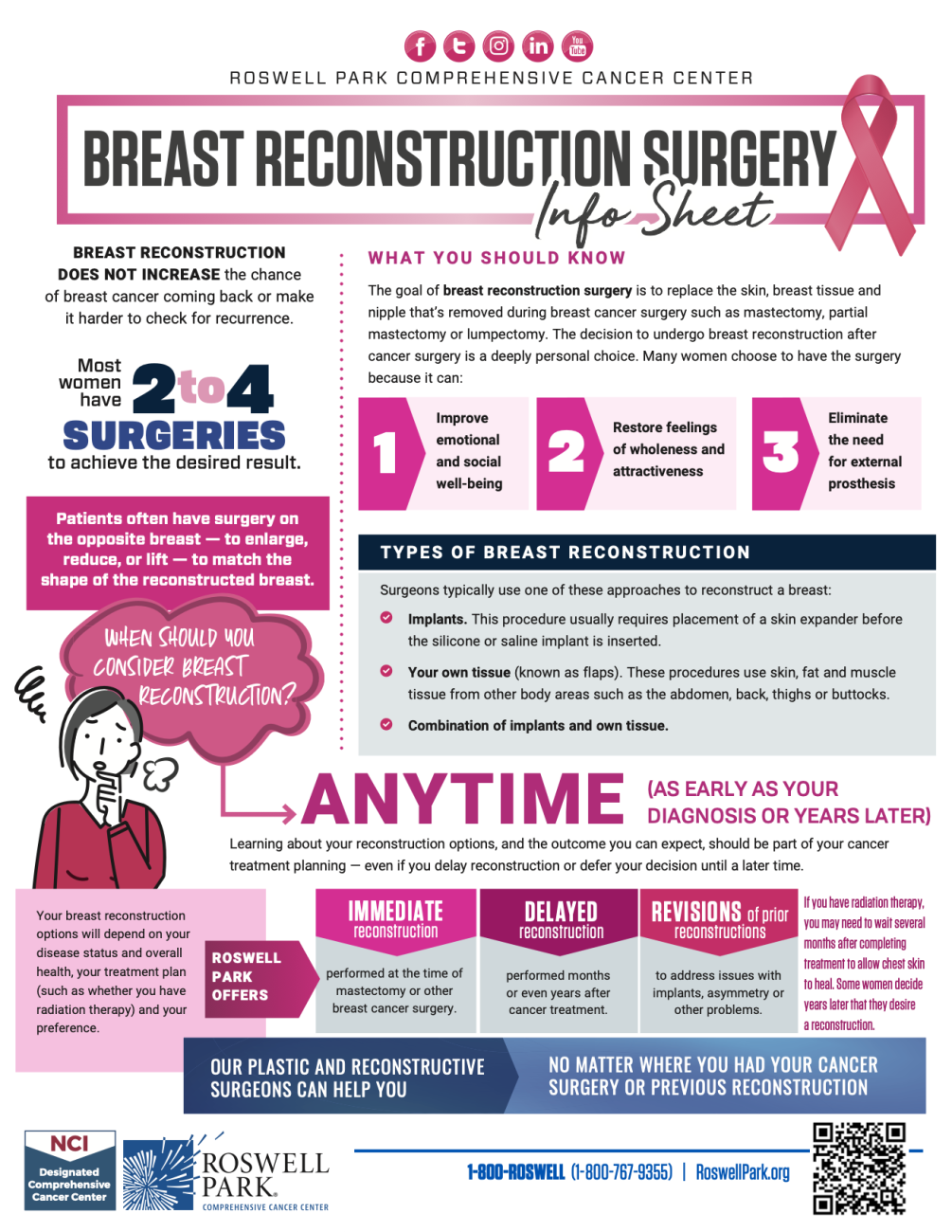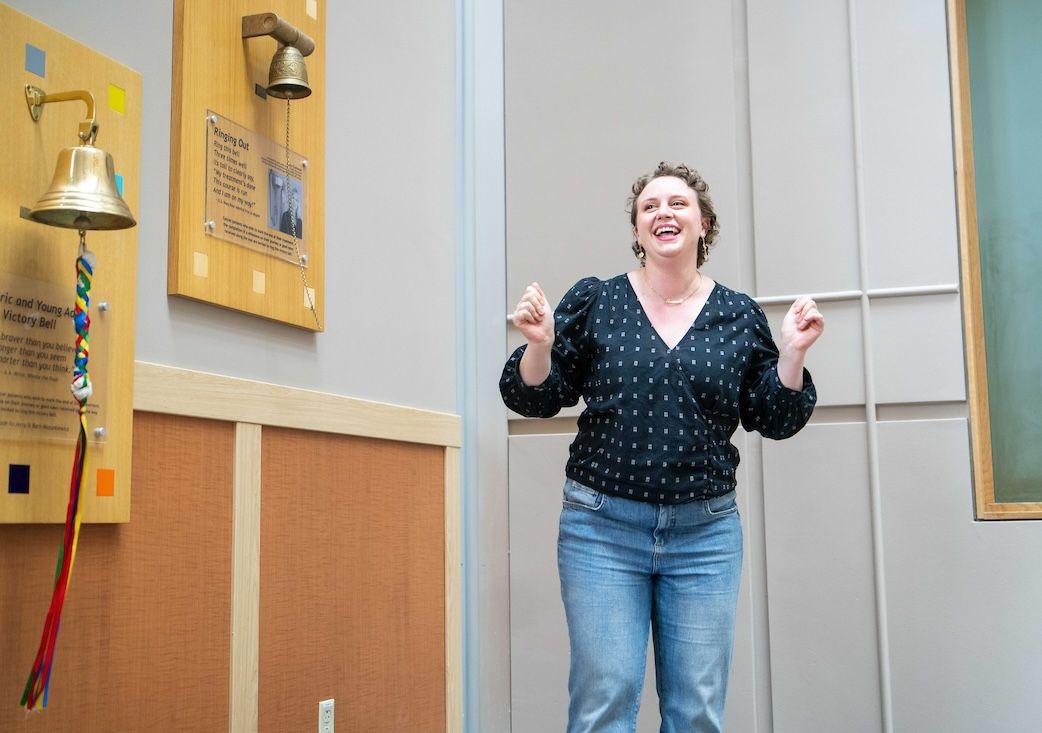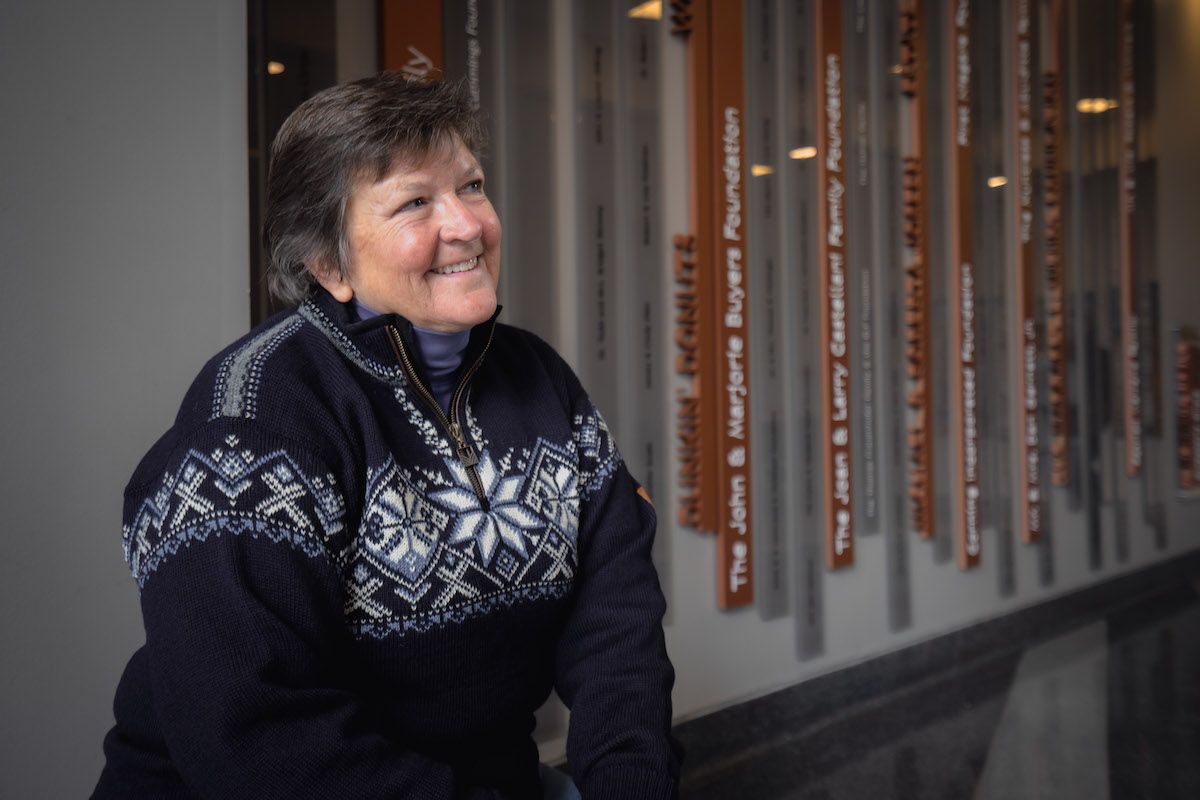The decision to undergo breast reconstruction after cancer surgery is a deeply personal choice.
Breast reconstruction surgery rebuilds a breast — repairing and replacing the skin, nipple and breast tissue — that are removed during a mastectomy or other breast cancer surgery. Women commonly choose to have the surgery to:
- Improve emotional and social well-being
- Restore feelings of wholeness and attractiveness
- Eliminate the need to wear an external prosthesis
Our plastic and reconstructive surgeons coordinate with your breast cancer treatment team to plan your reconstruction procedures around your other cancer therapies for optimal healing and outcome.
Schedule a consultation to learn which options may be best for you. Call 1-800-ROSWELL (800-767-9355) or submit the online form below. Appointments are also available in Williamsville at Roswell Park Care Network member, Breast Care of WNY.
Types of breast reconstruction procedures
Roswell Park offers both immediate breast reconstruction (which takes place at the time of your mastectomy) and delayed reconstruction (performed months or even years after your breast cancer surgery). Roswell Park’s plastic and reconstruction surgeons can offer you options no matter where — or when — you had your breast cancer surgery.
The type of reconstruction that’s best for you will depend on several factors including whether you had or will have radiation treatment, the condition and thickness of your chest skin, your health, and your preferences and goals. We offer the latest techniques and procedures, including the following:
- Breast implants. This type of breast reconstruction involves inserting an implant made of silicone or saline (salt water) to create the breast mound.
- Two-stage, expander-to-implant reconstruction. Typically, breast reconstruction is a two-stage process. Initially, a tissue expander is placed in the chest to slowly stretch and expand the muscle and skin. Later, the expander is removed and replaced with the implant.
- Single-stage, direct-to-implant reconstruction. Some women may be able to avoid the need for a tissue expander, and the implant can be placed directly to the chest.
- Prepectoral implant placement. Placing the implant above the chest muscle, rather than underneath it, reduces pain and discomfort from the surgery and helps to avoid “implant animation,” a condition where the implant moves as the chest wall contracts and relaxes.
- Implant removal and total capsulectomy (en-bloc capsulectomy). This technique removes the implant together with the surrounding scar (capsule) tissue.
- Management of various implant deformities. Revisional procedures include but are not limited to removal and replacement of ruptured silicone implants, correction of capsule contracture using biologic mesh placement or capsulectomy, change of implant position from under-muscle to above-muscle, correction of animation deformity.
- Autologous or flap reconstructions. These specialized surgical procedures use skin, fat, blood vessels and occasionally muscle tissue from other body areas, such as the abdomen, back, thighs or buttocks to recreate the breast. We offer several flap techniques for breast reconstruction:
- DIEP flap and modifications (TRAM, MS-TRAM) (abdomen)
- Lattismus (back)
- SGAP/IGAP (buttocks)
- TUG (thighs)
- Fat grafting to repair breast deficits and deformities
- Nipple reconstruction and/or tattooing
- Breast lift (mastopexy). A breast lift repositions the nipple and areola higher on the breast, removes excess skin and tightens surrounding tissue.
- Breast reduction surgery (reduction mammoplasty). This surgery removes excess skin, fat and tissue, to reduce the size and weight of the breast. Some women who plan to undergo prophylactic mastectomy due to BRCA status, may be good candidates for pre-mastectomy breast reduction. Undergoing this procedure before mastectomy repositions nipple-areola and increases likelihood of undergoing nipple sparing mastectomy.
- Breast augmentation surgery (augmentation mammoplasty). This surgery uses breast implants (silicone or saline) to increase the size of the breast, typically in a single step.
- Modifying procedures. Surgeries such as a breast lift, reduction or augmentation, are offered for the other breast to achieve symmetry with the reconstructed breast.
- Fat grafting and injections. Patient’s own fat is liposuctioned and then injected into breast to improve contour irregularities or asymmetry.
- Chest wall reconstruction. Some patients may need complex reconstructive procedures (i.e local or distant tissue transfer) to repair chest wall defects that include muscle and bone.
- Transgender reassignment breast surgery
Will insurance cover my breast reconstruction?
Federal law (Women’s Health and Cancer Rights Act of 1998) requires group health insurance plans (including Medicare and Medicaid) that cover mastectomy costs to also cover reconstruction surgery or other post-mastectomy treatments for female breast cancer patients. Required coverage includes:
- All stages of reconstruction on the affected breast
- Procedures to the other breast to create symmetry
- Prostheses and treatment of physical side effects of mastectomy, such as lymphedema
How soon after mastectomy can I have reconstruction?
You may undergo breast reconstruction at any time. You may wish to explore reconstruction as soon as you receive your diagnosis, or you may decide to wait for years after your treatment. Learning about your reconstruction options and the outcome you can expect should be part of your cancer treatment planning — even if you opt to delay reconstruction or put off your decision until a later time.
Schedule a consultation
Appointments are available from 8 a.m. to 5 p.m., Monday through Friday. Consultations are also available in Williamsville at Roswell Park Care Network member, Breast Care of WNY. Complete the form below or call us at 1-800-ROSWELL (1-800-767-9355).


